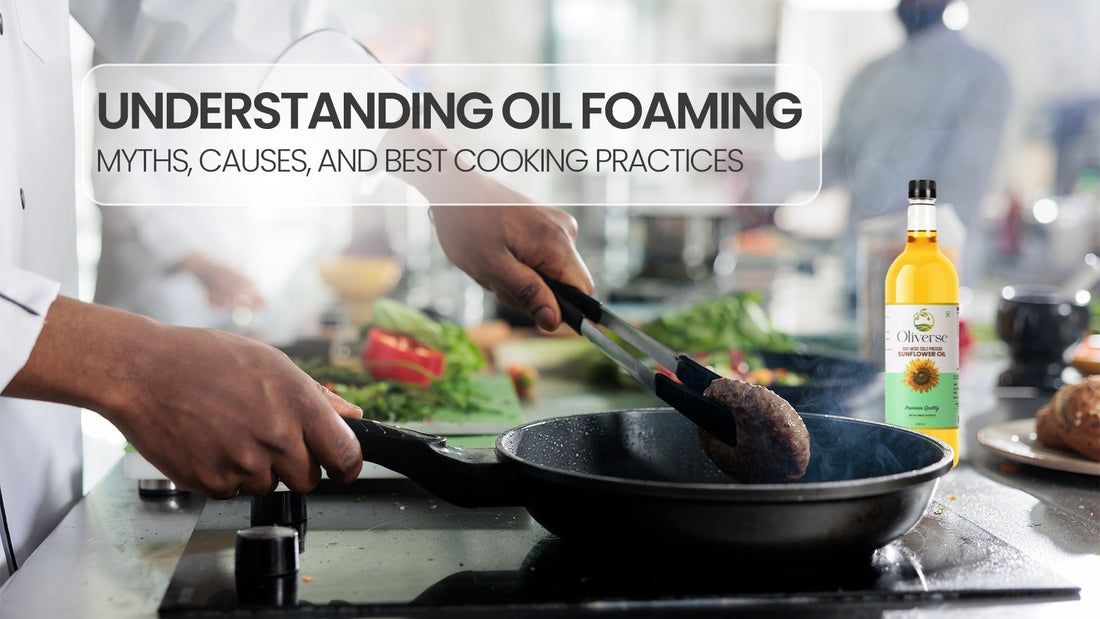Foaming in oil occurs when tiny air bubbles accumulate on the surface. While this may seem harmless, it often leads to misconceptions among consumers, who may associate it with adulteration or poor-quality oil. Consequently, many brands resort to using anti-foaming agents, which, when exposed to high temperatures, can break down into harmful substances—some of which have been linked to serious health risks, cause inflammation including cancer. For this reason, it is highly recommended to use oil that is free from artificial anti-foaming additives.
Oil foaming can result from multiple factors, often a combination of moisture, impurities, or overheating. While it is a common issue in frying, it does not necessarily indicate inferior oil quality. By following the preventive measures outline, you can minimize oil foaming, enhance safety, and improve frying efficiency. This not only ensures even cooking but also helps maintain the integrity of the oil, preventing unnecessary wastage and concerns over food quality.
How to Keep Oil from Foaming?
Cooking with oil is an essential part of many dishes, but sometimes, you may notice that the oil starts foaming during frying. This can be inconvenient or messy if not properly managed. Understanding the causes of oil foaming and how to minimize it to ensures more efficient cooking experience.
Refined oils often contain antifoaming agents, such as dimethyl polysiloxane (PDMS) also referred as polydimethylsiloxane, to prevent foam from forming. While unrefined or wood pressed oils like Oliverse doesn't contain antifoaming agents, foaming of oil can be expected.
Foaming in oil is a natural phenomena especially when cooking with unrefined or wood pressed oils, yet this can be minimised by following given steps below

Why Does Oil Foam?
Foaming occurs when moisture, impurities, or excessive heat interact with the oil. Here are some common reasons:
- Water Content: Moisture from food ingredients or utensils can cause oil to bubble and foam.
- Impurities in Oil: Leftover food particles and residues in the oil break down, leading to foaming.
- Overused Oil: Reused oils degrade faster and create foam.
- Excessive Heat: Overheating the oil beyond its smoke point can cause it to break down, leading to bubbling and foaming.
- Incorrect Frying Technique: Overcrowding the pan or using the wrong utensils can introduce air and moisture, causing foaming.
Tips to Prevent Oil Foaming
1. Use Fresh, High-Quality Oil
Always opt for high-quality, cold-pressed oils, such as those from Oliverse, to minimize impurities and degradation.
2. Keep Moisture Away
- Pat dry any food items before frying to reduce moisture content.
- Ensure utensils, frying pans, and ladles are completely dry before use.
3. Strain Oil After Use
If you’re reusing oil, filter out food particles using a fine mesh or cheesecloth to prevent buildup.
4. Avoid Overcrowding the Pan
Adding too many items at once can lower the oil temperature, causing excess moisture release and foaming.
5. Maintain Proper Oil Temperature
- Heat oil gradually and avoid overheating beyond its smoke point.
- Use a thermometer to maintain the optimal frying temperature (typically between 160°C to 190°C).
6. Use the Right Cookware
Using stainless steel or cast iron pans can help maintain stable temperatures, reducing the risk of foaming.
7. Use a Skimmer:
Regularly remove food particles and debris from the oil using a skimmer. These particles can contribute to foaming.
Are there any Natural Foaming Agents?
Yes, when using wood pressed(cold pressed) oils especially during rainy seasons (or where humidity is high) foaming of a cold pressed oil is a natural phenomena. Which can be addressed by adding a small piece of tamarind to help reduce foaming.
Oil foaming is a natural occurrence, especially in pure, cold-pressed oils that do not contain artificial anti-foaming agents like refined or hydrogenated oils. This should not be a cause for concern. However, if the foaming is accompanied by an unpleasant odor or a bitter taste, it may indicate that the oil has gone rancid or has been contaminated. In such cases, it is best to discard the oil and use a fresh batch to ensure the safety and quality of your food. Always store oil in an airtight container, away from direct sunlight and heat, to preserve its freshness and prevent degradation.
Conclusion
Foaming in oil is a natural occurrence, especially with pure, unrefined cold-pressed oils like those from Oliverse, as they do not contain artificial anti-foaming agents found in refined or hydrogenated oils. While foaming may seem inconvenient, it is a sign of oil in its most natural form. By following the right frying techniques, you can manage foaming effectively while preserving the oil's nutritional value and rich flavor. Choose Oliverse cold-pressed oils for a healthier, more authentic cooking experience!

